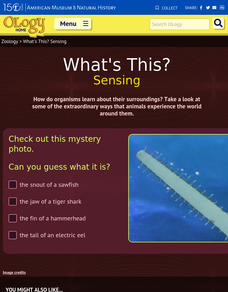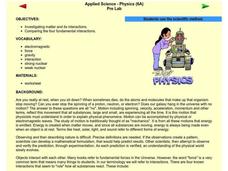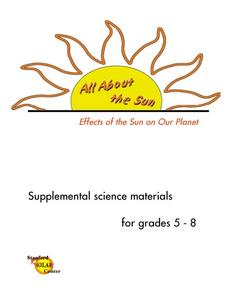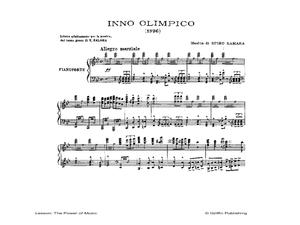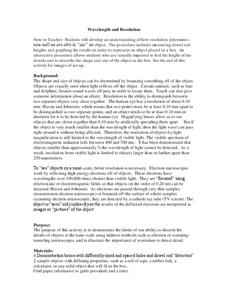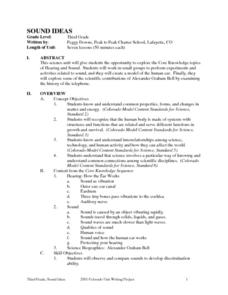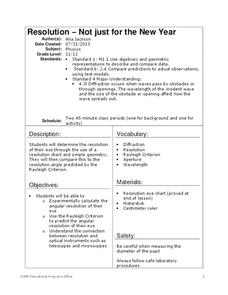Curated OER
Unraveling the Mysteries of Objects in Space
Learners study emitted and absorbed light, and label each type of spectrum. They identify elements by their spectral signatures and use a spectroscope.
Curated OER
Reflection, Refraction & Lenses
Students are able to describe what happens to light when it strikes different materials. They describe the law of reflection. Students are able to explain why a mirror froms a virtual image. They are able to describe diffuse reflection.
Curated OER
Sound Energy
Sixth graders understand properties and behavior of heat, light, and sound. They describe the production of sound in terms of vibration of objects that create vibrations in other materials. Students describe how sound is made from...
Curated OER
The Physics of Hummingbirds: Magic in the Air
Students study hummingbirds and how they use Newton's law. For this motion lesson students complete several activities and view videos of hummingbirds.
Curated OER
English Exercises: Mysteries of Anatomy
Consider this online interactive activity as a way to practice the names that often accompany human anatomy, such as the crown of the head and the roof of the mouth. Learners select an anatomy word with a double meaning from a drop-down...
University of Minnesota
Homeostasis of Thermoregulation
Whether you're battling the flu or trying to warm up on a chilly day, your body's ability to react to temperature change is fascinating! Anatomy scholars discover the fantastic feedback loops that control body temperature in a rigorous...
American Museum of Natural History
What's This? Sensing
There is a scallop that relies on sight so much that it actually has more than 100 eyes! There are many species that rely heavily on one sense or another. An online interactive resource has youth read about several of these animals. The...
Curated OER
Matter and Energy
Students explore energy by completing a science worksheet in class. For this principles of matter lesson, students define the vocabulary terms force, gravity, nuclear, and electromagnetic before reading assigned text about energy....
Curated OER
Starring...Bears!
Students illustrate a First Nations' legend. In this legend of bears lesson, students read several legends which involve bears and groups of stars or constellations. After reading, students illustrate portions of the stories. Also,...
Curated OER
Effects of the Sun on Our Planet
Students examine the effect of different types of light on the Earth. They discover the role of evaporation and the effects of the sun on the magnetosphere. They also observe different solar phenomena.
Curated OER
National Anthems of Selected Countries
In these national anthems worksheets, students read the general information and the anthems for the countries of the United States, Canada, Sweden, Switzerland, Zambia, Great Britain, Chile, Ethiopia, Korea, New Zealand, Greece, Taiwan,...
Curated OER
Seeing Sound and Sonar
Students grasp how underwater animals can "see" using sound waves. They practice making inferences, and build a conceptual understanding of sonar radar.
Curated OER
Enlightening Explorations, Part III
Sixth graders continue their examination of light. In groups, they make rainbows and examine the spectrum of visible light. They travel between various stations recording their observations about the behaviors of light. To end the...
Curated OER
Ways to See the Sun
Pupils examine how the regions of the Sun are studied using spectroscopy. They investigate the electromagnetic spectrum and the types of radiation that are associated with it. They use prisms and CD's to examine the light spectrum. They...
Curated OER
What Shape Is It?
Young scholars predict the shape of an unknown object by bouncing a ball on it. In this physics lesson, students relate this activity to how dolphins use echo-location to navigate. They analyze their lab result and discuss findings.
Curated OER
Sizing Up Sound
Sixth graders are introduced to the concepts of sound waves and frequency. As a class, they listen to the differences between different types of instruments. To end the lesson, they practice identifying low and high pitches and playing...
Curated OER
Jell-O Optics
Students observe an activity with Jell-O to learn about optics. In this investigative lesson students fill out a handout on the activity that helps them to investigate the index of refraction and the speed of light.
Curated OER
Wavelength And Resolution
Students perform a simulation of the workings of an electron microscope to discover that the resolution will need to improved to detect objects in the nano-scale. They use wooden dowels as detectors to determine the shape of objects in...
Curated OER
Patriotic Poems and Songs
Students memorize poems and songs to recite and sing at a Fourth of July concert. In this poems and songs lesson, students practice reciting 9 songs and poems while holding small flags.
Curated OER
Sound Ideas
Complete a unit of lessons on hearing and sound. Learners conduct sound experiments, research the history of the telephone and scientific contributions of Alexander Graham Bell, and create a model of the human ear.
National Nanotechnology Infrastructure Network
Powers of Ten with the Blue Morpho Butterfly
Explore the powers of ten while examining a Blue Morpho butterfly wing. Learners discover there is a lot more than meets the eye when one looks close enough.
Curated OER
Climate And the Greenhouse Effect
Learners demonstrate the greenhouse effect. They recognize that relatively small changes to our environment can stimulate significant climate changes. They determine that the "scientific method" is a process of testing hypotheses and...
Curated OER
Rat Round Up
Students build a device that captures and carries a pet rat safely back to its cage with out "harming" the rat or themselves. They build and experiment with wind-up or battery operated rat cat toys after predicting the outcome of their...
Cornell University
Resolution—Not Just for the New Year
Experiment with optical resolution using an inquiry-based lesson. Young researchers calculate fellow classmates' optical resolutions. They apply the information to understand the inner workings of optical instruments.








